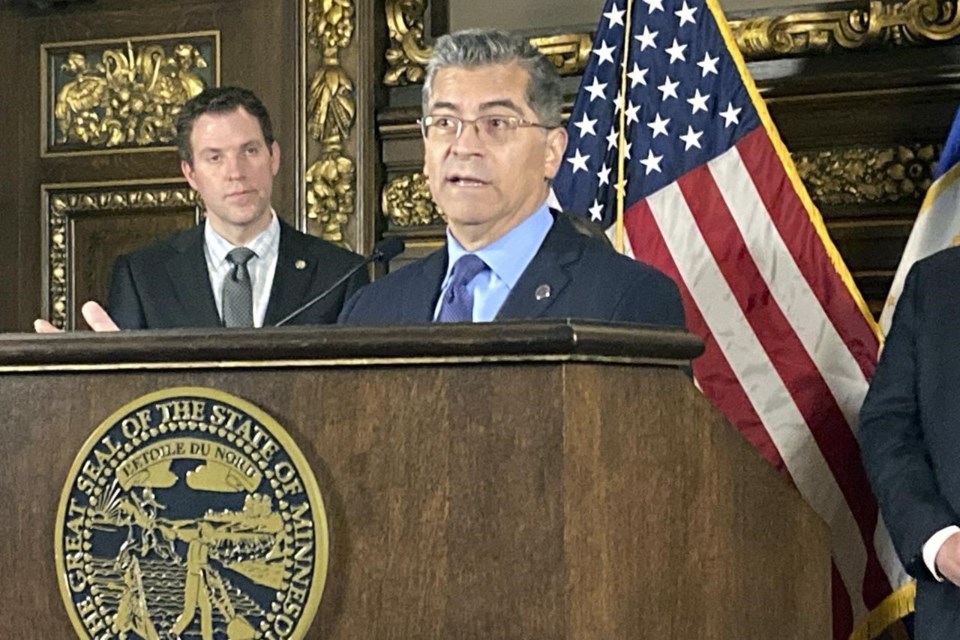ST. PAUL, Minn. (AP) — U.S. Health and Human Services Secretary Xavier Becerra visited Minnesota on Thursday on a Midwest trip to affirm the Biden administration's commitment to abortion rights despite the U.S. Supreme Court decision overturning Roe v. Wade.
Becerra went to a Planned Parenthood abortion clinic in St. Paul, then appeared with Gov. Tim Walz and Democratic legislative leaders at a news conference shortly before the Minnesota House began debate on a fast-tracked bill to codify abortion rights into state statues.
“You’re going to make history at a time when it seems like regression seems to be more on the table than anything else,” Becerra said. “It is a good day to be in Minnesota.”
Becerra's visit came three days ahead of Sunday's 50th anniversary of the Roe v. Wade decision, which established a national right to abortion that the Supreme Court rolled back in June. The Biden administration is using the anniversary to show that Democrats aren't giving up on the issue, even as the fight shifts to state legislatures from the divided Congress.
“It is time to follow Minnesota and do what's right for all Americans," Becerra said.
The secretary planned to travel Friday to neighboring Wisconsin to visit a family planning clinic in the Milwaukee suburb of Cudahy that lost the right to provide abortions when a statewide ban kicked back into law, and for a roundtable in Milwaukee on reproductive health with Democratic U.S. Sen Tammy Baldwin, of Wisconsin.
Abortion rights in Minnesota are already broadly protected under a 1995 state Supreme Court ruling that declared they're protected under the state constitution. But Democratic legislative leaders, citing the U.S. Supreme Court's reversal last summer, are rushing to pass statutory protections to ensure that future Minnesota courts can't undo them on the state level.
Both Democratic House Speaker Melissa Hortman, of Brooklyn Park, and Senate Majority Leader Kari Dziedzic, of Minneapolis, said they had the votes to pass the bill. The Senate version passed its final committee test Wednesday and could get approved on the floor as early as next week, though Dziedzic declined to be specific about when.
“It is not just an abortion bill,” Democratic Rep. Carlie Kotyza-Witthuhn, of Eden Prairie, said at the start of a debate expected to last into the evening. “It does guarantee the fundamental right for every Minnesotan to make personal and private decisions about their reproductive health. What it does not do is change the current landscape of reproductive freedom in Minnesota. This is a secondary level of protection to the constitutional freedoms we currently enjoy.”
But Republican Rep. Jim Nash, of Waconia, called it “the most extreme abortion bill in the entire U.S. It has zero guardrails — zero guardrails.”
Minnesota's Catholic bishops urged lawmakers to vote no on the bill, as well as separate legislation that's still moving through the committee process that would delete a list of abortion restrictions from state statutes that a judge declared unconstitutional in July. Together, the bills would leave Minnesota with hardly any limits on abortion.
“We are disappointed to see the quick pace at which these destructive bills are moving, and we hope to give legislators pause," the bishops wrote. "When contemplating policy on any issue, we must consider all those who will be affected. In this case, that includes the mother, father, and most especially, the unborn child whose life is being taken.”
Legislative leaders hope to put the bill on Walz's desk by the end of the month for his promised signature. Democratic leaders credit the potency of the abortion rights issue with their takeover of the Minnesota Senate in the November elections.
Walz pledged that women coming to Minnesota for abortions from states where they’re prohibited will be welcomed and protected.
“This piece of legislation will make Minnesota a shining beacon, an island in the upper Midwest,” Walz said.
Steve Karnowski, The Associated Press



